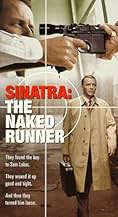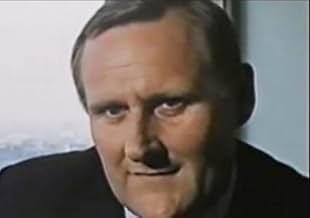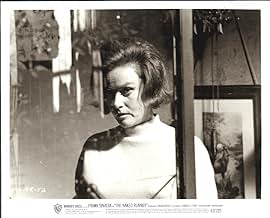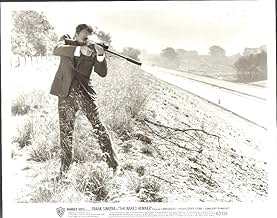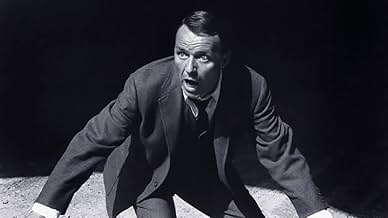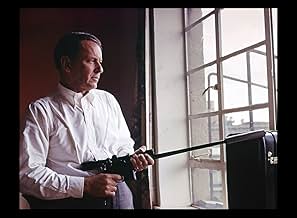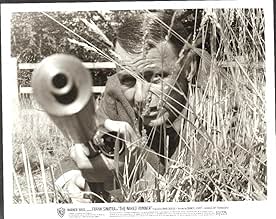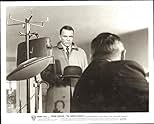NOTE IMDb
5,9/10
583
MA NOTE
Ajouter une intrigue dans votre langueDuring the Cold War, an American industrial-designer living in London is used by the MI-6 as an unwilling pawn in the spy game during a trip to a trade show in East Germany.During the Cold War, an American industrial-designer living in London is used by the MI-6 as an unwilling pawn in the spy game during a trip to a trade show in East Germany.During the Cold War, an American industrial-designer living in London is used by the MI-6 as an unwilling pawn in the spy game during a trip to a trade show in East Germany.
- Réalisation
- Scénario
- Casting principal
Victor Beaumont
- Radio Operator
- (non crédité)
Paul Beradi
- Ministry Man
- (non crédité)
George Curtis
- Man in Passport Queue
- (non crédité)
Stanley Meadows
- Psychiatrist
- (non crédité)
George Murcell
- Frenzl's Guard
- (non crédité)
James Payne
- Man at Printing Press
- (non crédité)
Avis à la une
The film opens with a man's emotionless face in close up, enormously loud classical piano music and a phone ringing in the background. Is he listening to the music or is overlaid title music? This combination of intrusiveness and unclear purpose at the very opening of the film bodes badly for what follows. Sinatra, the world's finest singer of his time, was not a good actor but starry company and stirring plot buoyed up his performances. Here though he was with an unstarry made-for-TV cast with a convoluted plot and uninvolving characters where the task of carrying the film proved too much.
Tribute should be paid to the career of its director Sydney J. Furie who appears to be still directing at the age of 85 following a career of 50 years including the brilliant Ipcress File, Lady Sings the Blues and a string of Cliff Richard vehicles early on. Slack deserves to be cut for him on The Naked Runner. As he acknowledged in his personal quote - not every film was a winner. Some definitely were, sadly not this one.
Tribute should be paid to the career of its director Sydney J. Furie who appears to be still directing at the age of 85 following a career of 50 years including the brilliant Ipcress File, Lady Sings the Blues and a string of Cliff Richard vehicles early on. Slack deserves to be cut for him on The Naked Runner. As he acknowledged in his personal quote - not every film was a winner. Some definitely were, sadly not this one.
There were harsh words written of that movie on the site and I think it's a bit unfair.Sure the screenplay looks like a cross between " The man who knew too much" and "the Mandchourian candidate".Sure the symbolism is somewhat ponderous: the lady and her puppets,the tunnel and daylight again.But it's an entertaining thriller,ideal for a rainy day :the screenplay is certainly smarter than that of the average thriller of today;Frank Sinatra does a good job,supported by a good cast ,particularly Darren Nesbitt as Colonel Hartmann .Not a masterpiece but not a dud either.People who like the movies I have mentioned can have a look.
A British espionage drama; A story based on a premise that British Intelligence cannot assign one of its own agents to murder a defector to Russia.
Frank Sinatra's performance was excellent - the best thing about the film. He gave a convincing portrayal of a middle aged man under duress, forced into completing a dangerous mission. The director's stylish direction and trademark camerawork created a distinct atmosphere as an espionage thriller, though it was hard to keep this consistent when the plot became protracted. The story dullens in the middle and is marred by an abrupt ending. The locations are all interesting, particularly post-war Leipzig.
Based on Francis Clifford's novel of the same name, The Naked Runner is an obscure but creditable thriller, and a rarely seen entry in Frank Sinatra's filmography.
To discuss the plot would be to spoil it so I won't do that. Suffice to say, furniture designer Sam Laker is pressured by a friend working for British Intelligence into doing a job in Leipzig to help an old wartime flame... but nothing is as it seems once he reaches East Germany. At that point we are firmly on Le Carre territory, with cross following double cross all the way to the end. And it is the end that is the problem; it cannot carry the weight of everything that has passed before.
The reasons for this are fairly obvious: firstly, in the novel, the reader is as oblivious as Laker as to what is going on and greets every new plot twist with a frustration and incomprehension that Laker shares. This serves to heighten suspense at every level, and Laker's character becomes a fascinating comparison exercise with our own reactions as a reader. The writer of the film, Stanley Mann, chose to place the viewer firmly on the other side of the plot - so we know what is happening to Laker, and why. This serves to undermine him as a character, making him appear hapless, transient, and surly; that Sinatra plays him as such reflects, I think, that he understood as a performer that a narrative mistake had been made. Secondly, the ending is abrupt; indeed Laker's exclusion, you might almost say his quarantine, from the plot is solved by precisely five seconds of hurried dialogue over the end credits of the movie. This is a serious error of judgment that leaves the viewer with a profound sense of disappointment, which is why I've titled this review The Non-Nude Runner: I felt a little robbed.
Apart from the botched ending it is an entertaining yarn. There are excellent performances by Peter Vaughn and Derren Nesbitt. Sinatra is very good too - his performance is low-key and it's obvious he had carefully studied the textbook performance for this kind of role; that of Richard Burton in The Spy Who Came In From The Cold.
Recommended for fans of Sinatra, and followers of cold war thrillers. But make sure you read the book - it's excellent.
To discuss the plot would be to spoil it so I won't do that. Suffice to say, furniture designer Sam Laker is pressured by a friend working for British Intelligence into doing a job in Leipzig to help an old wartime flame... but nothing is as it seems once he reaches East Germany. At that point we are firmly on Le Carre territory, with cross following double cross all the way to the end. And it is the end that is the problem; it cannot carry the weight of everything that has passed before.
The reasons for this are fairly obvious: firstly, in the novel, the reader is as oblivious as Laker as to what is going on and greets every new plot twist with a frustration and incomprehension that Laker shares. This serves to heighten suspense at every level, and Laker's character becomes a fascinating comparison exercise with our own reactions as a reader. The writer of the film, Stanley Mann, chose to place the viewer firmly on the other side of the plot - so we know what is happening to Laker, and why. This serves to undermine him as a character, making him appear hapless, transient, and surly; that Sinatra plays him as such reflects, I think, that he understood as a performer that a narrative mistake had been made. Secondly, the ending is abrupt; indeed Laker's exclusion, you might almost say his quarantine, from the plot is solved by precisely five seconds of hurried dialogue over the end credits of the movie. This is a serious error of judgment that leaves the viewer with a profound sense of disappointment, which is why I've titled this review The Non-Nude Runner: I felt a little robbed.
Apart from the botched ending it is an entertaining yarn. There are excellent performances by Peter Vaughn and Derren Nesbitt. Sinatra is very good too - his performance is low-key and it's obvious he had carefully studied the textbook performance for this kind of role; that of Richard Burton in The Spy Who Came In From The Cold.
Recommended for fans of Sinatra, and followers of cold war thrillers. But make sure you read the book - it's excellent.
Frank Sinatra's previous two films had flopped and he was sufficiently impressed with 'The Ipcress File' to work with Sidney J. Furie in this adaptation of Frances Clifford's novel. Although it fared pretty well at the box office as a film it must be accounted a failure. A defector has to be assassinated and British Intelligence is running out of time to find a suitable killer. He has to be sufficiently motivated and a crack shot. Agent Slattery sees a photograph in the paper of former wartime friend Sam Laker and realises that he has found the perfect candidate.......So far so good but thereafter the film falls down. Rather than letting the film speak for itself we are subjected to endless scenes of psycho-babble between a psychiatrist, Slattery and a cabinet minister describing the means employed to get Laker to do the job. Screenwriter Stanley Mann and director Furie have obviously decided to aim their film at the slowest-witted person watching and thereby robbed it of its impact. Also the ending is too abrupt to be satisfying. This is a pity because Sinatra is excellent as Laker and possesses the quality that great stars have of making you care what happens to them. Peter Vaughan and Derren Nesbitt give good support and there is a very nice performance from Toby Robins. Otto Heller is the cinematographer and there is a haunting theme tune by Harry Sukman which Sinatra later recorded as 'You are there' with lyrics by Paul Francis Webster. Critic Philip French coined the phrase 'Sidney J. Furie, signifying nothing'. A harsh judgement but regarding this film it certainly holds true.
Le saviez-vous
- AnecdotesWhile filming L'île des braves (1965), Brad Dexter had apparently rescued Frank Sinatra from drowning when he got into difficulty swimming. As a thank-you, Sinatra agreed to star in this film when Dexter was starting out as a producer; however, it was reported that he was very difficult throughout the filming and gave Dexter and director Sidney Furie many headaches.
- ConnexionsReferenced in I Am Woman (2019)
- Bandes originalesYou Are There
Music by Harry Sukman, Lyrics by Paul Francis Webster
Performed by Harry Sukman Orchestra
Meilleurs choix
Connectez-vous pour évaluer et suivre la liste de favoris afin de recevoir des recommandations personnalisées
- How long is The Naked Runner?Alimenté par Alexa
Détails
- Date de sortie
- Pays d’origine
- Langue
- Aussi connu sous le nom de
- The Naked Runner
- Lieux de tournage
- Sociétés de production
- Voir plus de crédits d'entreprise sur IMDbPro
- Durée1 heure 41 minutes
- Mixage
- Rapport de forme
- 2.35 : 1
Contribuer à cette page
Suggérer une modification ou ajouter du contenu manquant

Lacune principale
By what name was Chantage au meurtre (1967) officially released in India in English?
Répondre
